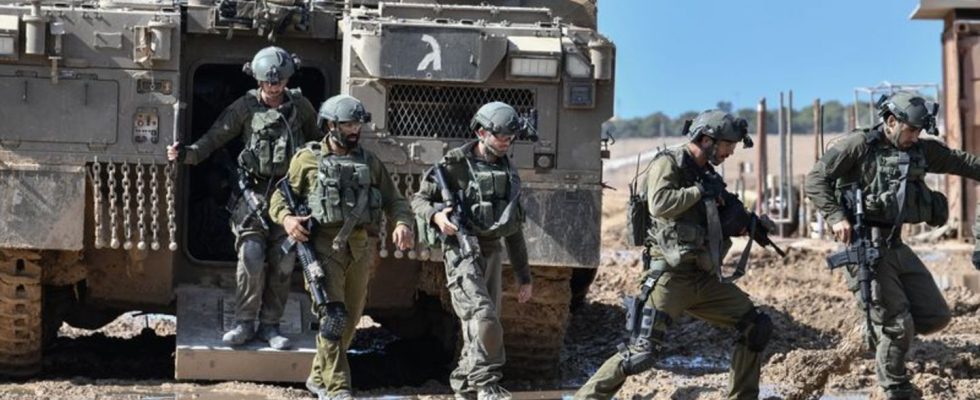questions and answers
Terrorist attack and counterattack: What does international law say?
Israeli soldiers get out of an armored vehicle near the Israel-Gaza border in southern Israel. photo
© JINI/XinHua/dpa
After the terrorist attacks by the Islamist Hamas, Israel is taking tough action against the organization. The Palestinians in the Gaza Strip are suffering. How does international law view the situation?
The extremely bloody conflict between the Islamist Hamas and Israel raises many questions. In addition to soldiers and fighters, many civilians on both sides are wounded, killed or kidnapped. What does international humanitarian law say, and where is the limit to war crimes?
Does international humanitarian law apply to this conflict?
Yes. It is irrelevant whether it is a declared war, an international armed conflict or an internal armed conflict. The basic principle of so-called international humanitarian law – the international rules governing warfare – is in all cases that civilians must be protected as much as possible. Attacks may only ever be carried out on military targets.
From the perspective of the International Committee of the Red Cross (ICRC), which monitors compliance with the laws of war worldwide, there is an “armed conflict” between Israel and a non-state armed group – the military wing of Hamas. According to the Red Cross, international humanitarian law also applies in this case.
How should the use of human protective shields be assessed?
Anyone who uses civilians to protect military targets is clearly committing a war crime, according to international law expert at the University of Basel, Anna Petrig. “That’s never allowed.” Against this background, Hamas’s request to the population of the Gaza Strip not to leave the northern half despite Israeli warnings also seems problematic.
Can Israel attack even if civilians are at risk?
In principle yes, says international law expert Petrig. As long as it is a military objective, there is initially no legal objection to this. Civilian collateral damage would have to be proportionate to the military advantage achieved. The destruction of a large military airport therefore justifies more civilian casualties than the attack on a small military position.
Can Israel cut off gas and water to the Gaza Strip?
Such a siege would be a “collective punishment” of civilians that is strictly prohibited under international law, said UN Human Rights Office spokeswoman Ravina Shamdasani. Petrig, on the other hand, says: “In principle, sieges are not a forbidden method of war.” But if the goal was to starve the population, it would be illegal and even a war crime. “But there are gray areas,” said the expert. It is unclear in international law whether it is enough if starvation is a side effect of the siege – or whether starvation must be the goal itself.
How should the call for mass evacuation be classified?
The order from Israel to evacuate the northern Gaza Strip, along with the siege, violates international law, the ICRC found. The Red Cross argued that in the densely populated coastal strip, the population had no chance of finding safety elsewhere.
How should an Israeli ground offensive in Gaza be assessed?
The same applies here: As long as military targets are in sight and the number of civilian victims is not disproportionate, a state may also take action in a very densely populated area. According to Petrig, the assessment of proportionality is not tied to a defined upper limit for civilian casualties.
How does Israel argue?
President Izchak Herzog has emphasized that the Israeli military strictly adheres to international law. “But we are at war,” he added. “And we will fight until we break their backs,” he said of the Islamist Hamas. The Israeli army emphasizes that there is no “area bombing” in the Gaza Strip. Each target is linked to Hamas, it is said. If civilians die, it is unintentional. The call for a mass evacuation of the northern Gaza Strip is justified in Israel as a protective measure for the civilian population.
Who should judge the question of war crimes?
The International Criminal Court in The Hague could be considered for this – for example when dealing with the atrocities of the Yugoslav wars.
Does international humanitarian law effectively protect civilians?
International humanitarian law attempts to strike a balance between military interests and humanity. If the rules are too strict, the military will not stick to them from the start, says Petrig. The technical synonym for international humanitarian law is revealing: “The law of armed conflict.”
Statements by the UN Human Rights Spokesperson Communication ICRC ICRC: Questions and answers on international humanitarian law

